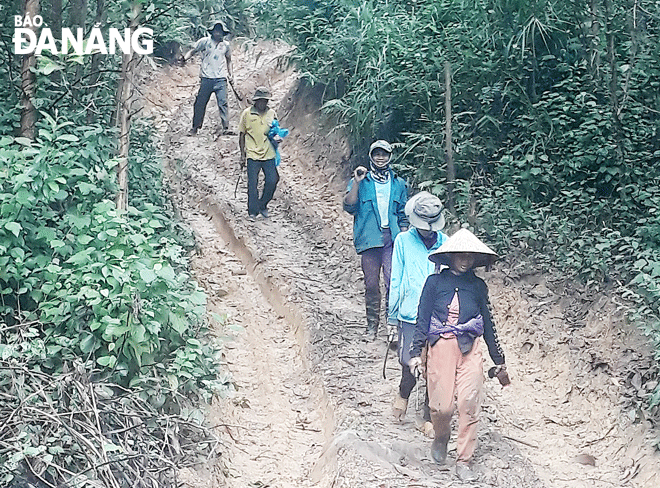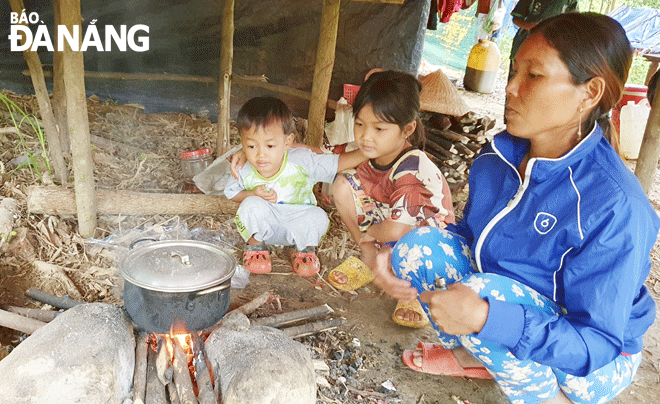H'Re people- diligent hired labourers planting acacia forests in mountainous commune
On rainy and windy days, H’Re people still silently work hard on precarious cliffs or deep ravines to earn money for living expenses, their children’s education and medicine for elderly parents in their hometown.
 |
| The H'Re people work in the forest to earn money to support their family back home. Photo: N.H |
1.It was 8:00 a.m. but the sky was still grey predicting heavy rains. Ms Dinh Thi Ut had not gone to work that day since her husband, Mr Ui, was sick due to working in the forest on rainy days. In the canvas shack under the canopy of acacia leaves, Ui covered himself with a blanket and lay on a stall made of acacia wood sticks with their shells intact.
Ms Ut’s family is one of the eight households of the H'Re ethnic group from Long Mai Commune, Minh Long District, Quang Ngai Province heading to Hoa Ninh Commune, Hoa Vang District, Da Nang to work for the owner of an acacia forest. As their tradition, the H'Re people going to work far away often bring their wives and children with them. They build shacks, raise chickens and a few dogs, gather together like a small hamlet in the forest.
On a daily basis, Ut and other women get up at the cracking dawn to prepare food and water amid the flickering light of the fire in the early morning freezing of the mountains. After their breakfast, the whole group climb to the forest, tear the white mist like a mirage to start a working day. They clear the land, dig holes for acacia planting, weeding, and harvesting acacia.
An acacia forest is often divided into many sub-zones with each of them differing in planting and harvesting time, therefore, workers have jobs all year round with an average wage of about VND 250,000 /person/day.
The shacks of H'Re workers are located precariously by the stream at the foot of Cha Nai mountain to serve their convenience to drink, bathe and catch fish. During the daytime, all the shacks were empty except for dogs slept by the stove made of three cold stones. Looking at the direction not far away, a group of H'Re people carrying acacia seedlings hastily crossed the stream from the edge of the forest to the top of the mountain with the wage of VND 150,000 for each trip.
2. During the prolonged days affected by the COVID-19 pandemic, the number of H'Re people in Quang Ngai Province going around making a living by growing and harvesting acacia for acacia forest owners is very large. “Our village is really poor. We can not earn money to feed our children, pay for their tuition, and take care of our elderly parents if we don't go to work," Dinh Thi Ut confided.
Each household in her hometown owns 500 m2 to 1500m2 of terraced fields, which are arid all year round and getting more and more depleted. Therefore, people here head to other areas right away when someone comes to recruit labour for acacia plantation even though they know that hardships are waiting for them.
Growing acacia, weeding, clearing is laborious but not dangerous. At the time of harvest, workers usually worry about accidents. Trees must be cut down, cut short, smashed, peeled, gathered into a pile before loading them on trucks. If these procedures are not done carefully, falling trees causing tragic accidents will become an obsession that clings to the life of forest growers.”
 |
| Ms. Dinh Thi Ut prepares meals for her family after hard-working hours. Photo: N.H |
Even a small wound such as a wood splinter in the hand when harvesting acacia can become dangerous when infected. However, whenever someone has some unfortunate accident while working, they are taken to the hospital by the forest owner and paid for the fees.
Amid the pouring rain, a few children were leaning on their homemade raft to play in front of the shack when water from Da Hang hole was overflowing on the grass surface. The oldest boy is Dinh Van Toan, 10 years old, whose name at home is Mit. His younger brother is 3 years old. Last summer vacation, he followed his parents and still have not returned to school due to the pandemic. When being asked what usually do when his parents go to work, the boy replied proudly "I take care of my younger brother and prepare meals for my parents to go to work".
During stormy days, the flimsy canvas shacks were in danger of not being able to withstand the storms. Therefore, Mr Kinh, the forest owner, took the car to transport all of his H'Re workers to Hoa Trung Primary School and completely support food and accommodation to ensure the safety of the workers.
3. H'Re workers going to work in the forest in Hoa Vang still keep the habit of going back to their hometown once a month to visit their family and give them money for living expenses. It is also an occasion for them to buy more rice, spicies, fish sauce, dried fish for the coming days in the forest.
In the days of the Covid-19 resurgence in August, 2021, many groups of workers from provinces such as Quang Ngai, Nghe An and Thanh Hoa were stuck in Hoa Bac Commune. The local government has provided food support for them to ensure the regulations of the municipal People's Committee.However, the number of H'Re people in Ba To, Quang Ngai Province who go to Hoa Bac to work in the forest still insisted on returning to their hometown even though they have to walk hundreds of kilometres. Therefore, the city police and district police supported cars to bring them back to their hometown to ensure traffic safety the COVID-19 prevention and control regulations.
When the pandemic situation was temporarily stable, this group of 15 H'Re people returned to Hoa Bac to continue climbing and planting forests. On rainy and windy days, they still silently climbed on precarious cliffs or deep ravines to earn for living. "Working until becoming an old person who no longer has the strength to climb mountains, " said Dinh Thi Ut, a H'Re woman who has had many years following her husband to work as a hired labourer.
Reporting by NHU HANH- Translating by T.VY